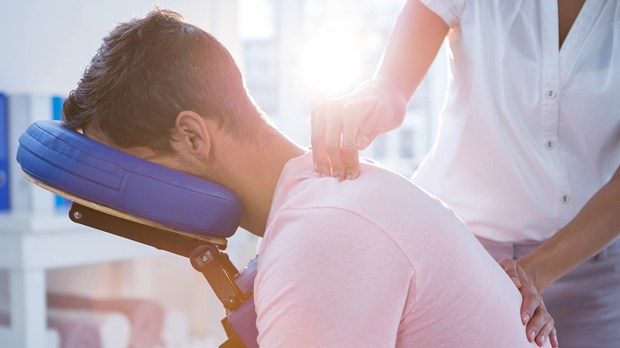Lenten Campaign 2025
This content is free of charge, as are all our articles.
Support us with a donation that is tax-deductible and enable us to continue to reach millions of readers.
True confession: I’ve always thought massages were a silly luxury, ranking them somewhere between facials and mud wraps on my “frivolous uses for perfectly good money” scale. I became an athlete pretty late — in my 30s — so I wasn’t exposed to the existence of sports massages when I was younger, and my only two massages had been Mother’s Day gifts that I wanted to enjoy, but mostly just felt guilty about.
When I became a personal trainer, though, I learned that regular massages are a vital part of many people’s health and wellness routines — not a last resort when some muscle is overworked and overstressed, but a preventative step to work out knots, reduce inflammation, and keep the muscles relaxed and limber. For athletes, massages are similar to regular car maintenance — you don’t wait until your oil runs out and the engine starts smoking before you get it changed, because then you’ll have major repairs to do that could have been prevented by regular maintenance.
While I understood the concept, though, massages still fell into the category of “luxury self-care” for me … until I began a strenuous new training program a few months back. After the first month, I learned there was a whole new level of soreness I’d never approached before, the kind that grips your muscles so fiercely you begin to genuinely fear stairs, high shelves, and dropped objects. I worried I’d actually torn something — or everything. After I began whimpering involuntarily during a mild exercise demonstration, my friend and fellow trainer finally convinced me to “stop being superior, and go get a massage.” So I did.
I wouldn’t say it was a pleasant, luxurious experience by a long shot. In fact, it was one of the most physically intense and, yes, painful experiences I’ve had in years. I learned a lot about my own misconceptions of massage — including how poorly understood and underappreciated the many benefits of massage are. Here are the three most surprising benefits of getting a massage.
1Massages help manage digestive disorders
If you think massages only effect lean muscle tissue like biceps and hamstrings, guess what? You’re wrong, just as I was. Not only can massage therapy help alleviate gas build-up and blockages in the small intestine and colon, it can also significantly reduce symptoms of acid reflux, Crohn’s disease, and IBS by redirecting acid and food back into the stomach for proper digestion. Of course, as with any medical disorder, massage therapy should not be substituted for medication or check-ups by a medical professional — but used in conjunction with medication under a doctor’s supervision, massages might reduce the need for medication and the frequency of flare-ups.
2Massages strengthen the immune system
Mamas, teachers, health-care workers, rejoice! We have yet another tool for our flu-season arsenal. Researchers at Cedars-Sinai report that massage therapy — particularly Swedish massage therapy — has a clinically significant effect on the immune and endocrine systems. A single 45-minute Swedish massage significantly impacted levels of white blood cells and cytokines (markers of immune response that help protect the body from disease), as well as markedly decreasing the stress hormone cortisol, which weakens the immune response. The downside is that this response was only significant among participants who underwent specialized Swedish massages, meaning you’ll have to get an actual massage from an actual massage therapist. The upside is … you’ll have to get an actual massage from an actual massage therapist. You’re welcome.
3Massages can drastically reduce anxiety and depression
Although reducing stress is a widely accepted benefit of massage therapy, there’s been scant research done on exactly how or why this works. But researchers in Miami have discovered that massages help reduce depression and anxiety by altering the body’s biochemistry — specifically, reducing cortisol (the stress hormone, remember) by up to 53% and boosting the production of serotonin and dopamine, two neurotransmitters that are the focus of most depression and anxiety medication. I don’t know about you, but cutting your stress level literally in half sounds like a magical new wonder drug.
It’s not new, though — it’s as old as Adam and Eve. Our bodies and our brains are built to live in communion with other humans, and the absence of human contact in our touch-starved society is literally damaging both. Massage therapy isn’t a solution, of course, but it is a kind of therapy to help alleviate the real, physical damage wrought by stress from loneliness and lack of physical contact … which is hardly a luxury. It’s actually a basic human necessity.

Read more:
What to do while you’re waiting for medical test results

Read more:
Defining self-care in spiritual terms

